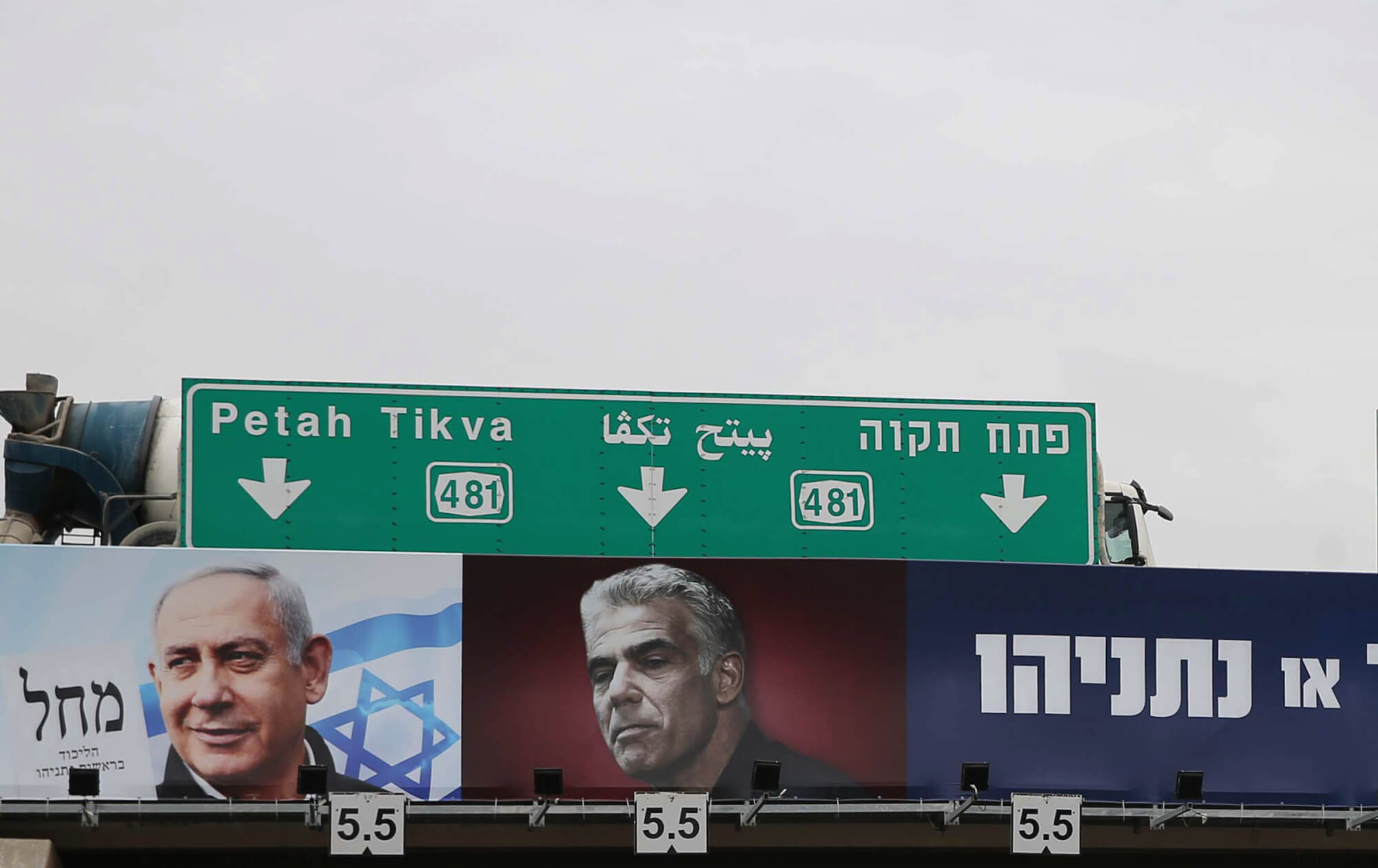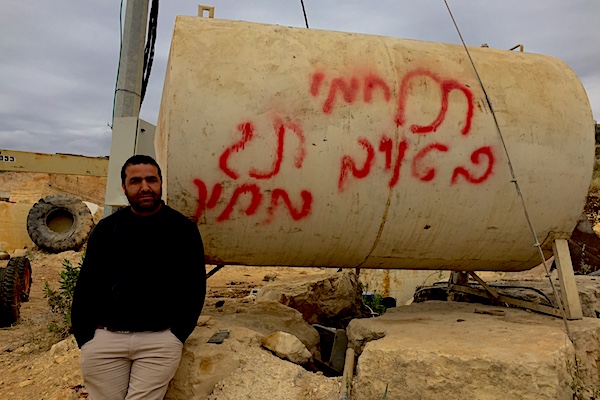
The news from the four elections inside two years in Israel is that there is little ideological debate in the country: rightwing Jews hold a very strong majority. While Israeli voters are deeply divided over Netanyahu, nearly 80 of the 120 members in the new parliament are rightwingers, and the non-rightwingers are overwhelmingly centrist. The Jewish left is tiny, Meretz’s 6 seats. Meretz is the only faction in Israeli Jewish political life that actually takes a strong position on the occupation.
A lot of Israel’s friends in the U.S. describe the country as both Jewish and democratic. That sounds like a good description inasmuch as the Israeli elections revolve around one question, Which Jews will run the country?
It is true that the 20 percent or so of the Israeli population that is not Jewish can vote, but Palestinians are never allowed anywhere near the executive branch. And all the leading Jewish parties campaign by saying they will have nothing to do with the Palestinians parties. And all the coalition-action in the next few weeks will involve Jewish leaders (with an occasional sideshow that amounts to nothing).
Discussion of the settlements was completely absent in this election. “The Palestinian issue is literally and figuratively over the hills and far away,” Neri Zilber said on a J Street zoom.
Palestinians think very differently on these matters than Israeli Jews. They are very strongly against the occupation and against discrimination inside Israel. Palestinians pushed the case against Israel in the International Criminal Court that every Jewish party opposes. Even Meretz can’t support the ICC prosecution.
But Palestinians don’t count. There are of course roughly equal populations of Jews and Palestinians under Israeli governance, between the river and the sea, nearly 7 million each, but the Palestinians enjoy second-class political rights in Israel, and none at all in the West Bank and Gaza. Israel made this arrangement official in its Nation State Law of 2018, which said that Jews have the exclusive right of self-determination in the land of Israel, with higher language and land rights. And the 80 rightwing votes in the Knesset are all committed to a definition of the “land of Israel” that goes all the way to the Jordan river.
Israel surely has a robust democracy among its Jewish parties, but the contempt for Palestinian opinion among Jewish pols is pervasive and disturbing. On i24 News the other day, a spokesperson for Likud, Netanyahu’s Party, said that Ra’am, the Islamist Palestinian party that won a surprising 4 seats, could only be a player in coalition discussions if it recognizes Israel as a Jewish state.
Palestinians don’t want to recognize Israel as a Jewish state, and you can understand why. That means derogating their own rights. And saying the ethnic cleansing of Palestinians beginning in 1947 and continuing to this day is just part of the program. Palestinians don’t like those policies; so it’s no wonder they’re kept anywhere from power. Israel lately revoked the travel permit of the Palestinian foreign minister because he supports the ICC investigation. And the U.S. government has no comment on the arrogant action.
Of course it is hard for Israel to maintain the “democracy” idea when half the population is effectively disenfranchised from deciding the government.
That contradiction is catching up to Israel even in the U.S. discourse. Important developments include: The Israeli human rights group B’Tselem saying in January that Israel maintains an “apartheid regime of Jewish supremacy” over all peoples between the river and the sea. Then the International Criminal Court launched its investigation of war crimes that include the settlement project. And some mainstream writers have increased the pressure on the Jewish democracy, from Peter Beinart calling for one democratic state to Nathan Thrall saying that liberal Zionists are enabling apartheid by promoting the fiction that the occupation is a separate order of business from Israel inside the Green line.
Today liberal Zionists want to focus on two headlines from the election. Bad news first, a fascistic theocratic Jewish movement once barred as racist is now installed in the legislature in the Religious Zionism party’s 6 seats. “The volkish element is now coming into its own,” Yossi Gurvitz said in our podcast yesterday. “The Knesset now contains 20 seats of racist Jewish supremacist parties, and they’re coming into their own and not going anywhere.”
Some American politicians and many center-left American Zionist groups are upset about Religious Zionism’s rise.
The other headline, which J Street is sure to trumpet at its conference next month, is the rebirth of Labor, which has seven seats when it might have had none. “I think Merav Michaeli is the new leader of the left,” Gurvitz says. “That’s not precisely good news, because she acknowledges that she doesn’t want to talk about the occupation. But basically she is a very elegant and eloquent speaker and she can get people around her.”
The problem with focusing on the headlines, though, is that they distract from the clear political lesson of the last 15 years, which four recent Israeli elections merely solidify: Israeli government did everything it could to destroy the possibility of a Palestinian state, and it succeeded.
Except for a fringe in Meretz and Labor, Israelis regard the occupation as Israel. “The rightwing [voters] see anything to the left of Gideon Sa’ar as giving up on the land of Israel,” Dahlia Scheindlin explained on a New Israel Fund call yesterday. “This land is ours, that’s what they say,” she related, and the only issue is, How much more land should we take?
Israel is politically unified in that understanding. Scheindlin says that the two men who might conceivably replace Netanyahu as prime minister, Benny Gantz and Yair Lapid, would change the tone but not the policy; they would give lip service to a two-state solution but “set unmeetable conditions” for Palestinians.
So that’s all you need to know about Israel. It’s a rightwing country that has no interest in granting sovereignty to its Palestinian population.
The real pity is that liberal Americans cooperate with these intolerant forces. “We pretended to my shame in the Obama administration that Netanyahu was interested in a two-state solution. When I don’t think he was, ever,” Obama aide Ben Rhodes says regretfully now– when the scam has been played.
The real pity is that Democratic politicians and the liberal Israel lobby will continue to go along with that charade. They will tell you that all we need is a two-state solution, when it was killed ten years ago, by the Jewish democracy.
Update: I revised this piece to reflect final vote tallies that gave Meretz an additional seat to the number I stated, and Ra’am and Religious Zionism one fewer each. Thanks to Jonathan Ofir.
Related posts:
Views: 0
 RSS Feed
RSS Feed

















 March 27th, 2021
March 27th, 2021  Awake Goy
Awake Goy 




 Posted in
Posted in  Tags:
Tags: 
















